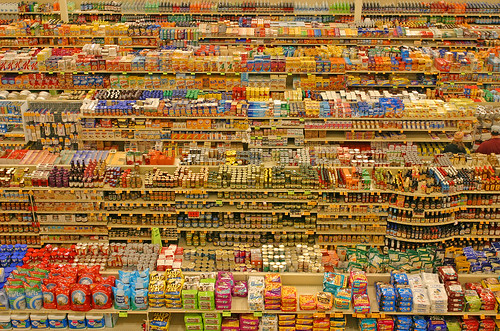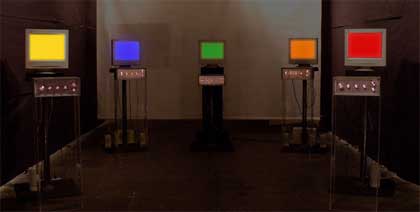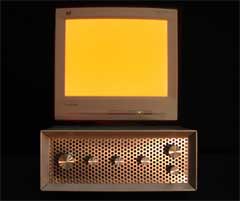 It is allegedly a remarkably similar one.
It is allegedly a remarkably similar one.
29 Jan 2007
dopa ii
There are laws, and there are hasty-rushed-and-bad-laws (Any legislation that gets brought in on the back of "this week's moral panic". Any son of DOPA is liable to fall into the latter category.
27 Jan 2007
feeling 'russian'

Shortly before Christmas, a new Tesco's opened in Carmarthen. It is allegedly the largest Tesco in West Wales... I hate it. I used to hate the huge one in Swansea, but this one really bites. What I hate about it most is the inhuman scale of the place, the only way I can describe it is to borrow a word from Watership Down - Tharn.
The first time I remember going tharn in a supermarket is the first time I visited the Safeway near B's old place in Portland. I stood in front of a dizzying array of 'hamburger helper' which seemed to stretch off as far as my eyes could see. What the hell was 'hamburger helper' and why did it need a whole aisle?
Anyway, this picture took me right back to that day in Portland.
If you are wondering why we shopping has become such an ordeal of endless choices, Malcolm Gadwell's Ted Talk might give you some insight as to why there are so many spaghetti sauces in the next aisle to all the hamburger helpers.
14 Jan 2007
new blog, new year, new resolve
Last week, I finally got around to contacting Business Eye, who have put me in touch with Venture Wales so that we can look at seeing if we can make a bit of money marketing Welsh companies to a very targeted, mostly American audience and Co-op Wales who they think might help me get the proposal off the ground in some sort of form. Fingers crossed.
11 Jan 2007
 Instead of presenting complex images (computer programs or photographs) each computer of The Analog Color Field Computer (ACFC) repurposes its monitor such that a solid field of color is spread across its entire display. And instead of producing complex sounds (clicks, beeps or music) each sculpture produces a pure musical tone.
Instead of presenting complex images (computer programs or photographs) each computer of The Analog Color Field Computer (ACFC) repurposes its monitor such that a solid field of color is spread across its entire display. And instead of producing complex sounds (clicks, beeps or music) each sculpture produces a pure musical tone. By minimizing the content of its audio-visual renderings to solid colors and pure tones, the device offers relief from the myriad of visual, sonic and operational conventions traditionally associated with computer systems. The audience can adjust the hues, pitches and rhythms of each computer and thus assume a role previously reserved for a computer's video processor. They can manually regulate the electrical currents that command the monitor's color circuitry. The ACFC does not employ display systems as media for the visualization of computed images, instead the aesthetic artifact is derived from the physical manifestations and electrical workings of computer monitors themselves.
The piece also points to the rate at which Cathode Ray Tube based monitors are being discarded to leave the space to the much leaner flat panel displays. The ACFC gives the screens a new life as pieces of art. As a tribute to the CRT century-old technology, the installation utilizes analog electronics almost exclusively.

6 Jan 2007
seasonal readings
So, I want to tell you about 3 of the books that I have been reading over the last 3 weeks.
- Phillip Reeve, Mortal Engines. (I picked this up in a school library while I waited for an engineer to call me back. By the time he called back I was on chapter 4 and totally sucked in. I just had to buy it then. If you liked the Phillip Pullman, "His dark materials" trilogy, you might like this. Pretty gory for the age group it was designed for though.
- Sally Hacker, Doing it the Hard Way. One of my presents off B. It was a book that I used extensively in my MA dissertation and really wanted to read again.
- Moira Vincentelli, Women Potters. Great book, it examines women's pottery that has been pretty much ignored on a global basis. We are not talking about the fancy thrown and glazed stuff here, we are talking about hand built and bonfired. It also features interesting insights as to why a lot of the 'development' projects in pottery fail as well as a chapter on women's figurative ceramics.
"Never forget, Apprentices, that we Historians are the most important Guild in our city.We don't make as much money as the Merchants, but we create knowledge, which is worth a great deal more. We may not be responsible for steering London, like the Navigators, but where would the Navigators be if we hadn't preserved the ancient maps and charts? And as for the Guild of Engineers, just remember that every machine they have ever developed is based on some fragment of Old-Tech - ancient high technology that our museum keepers have perserved or our archaeologists have dug up."
"Bureaucratic organizations make responsible behaviour difficult. They tend to foster a "who cares?" attitude at lower levels of the organization and a "not me" attitude at the top (Gouldner 1976: Garson 1977). Those who chose engineering as a profession are likely to work in large bureaucratic organizations, but are less likely than most to have an interest in social structure or the complexities of social relations (Rossi 1975). Further, engineering education does little to increase students awareness of these phenomena. And so the engineer is oblivious to the ways in which he or she both affects and is affected by patterns and relations on the job.
If engineers do have a "blind spot" about social structure, altering current patterns and finding alternatives will be most difficult"
"As with all new technology, the introduction of water filters has to be accompanied by an education programme to ensure people understood how to use and maintain them properly.
There is a good argument for suggesting that it is more viable to build on the skills that are already in the community rather than seek radical change. It is particularly dangerous to make people dependent on technology that they cannot themselves produce, control or maintain. Self sufficiency is often assumed to be the aim but in fact projects can create dependency when equipment fails or followup expertise is not there."
Are we noticing any themes emerging?
dead as a DOPA
On the topic of Web 2.0 and education, a belated congrats to Miles Berry, who was awarded the Teacher: Primary award from BECTA this year. I regularly read his blog in Elgg and think he is doing a bang up job of using ICT creatively in his school and is a great advocate of Open Source software.